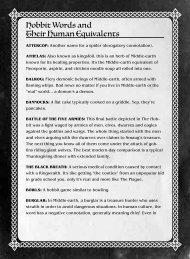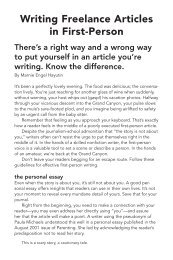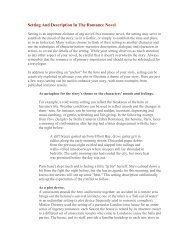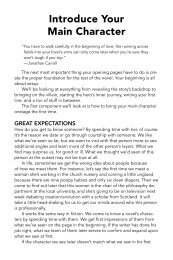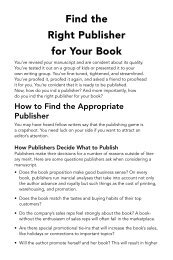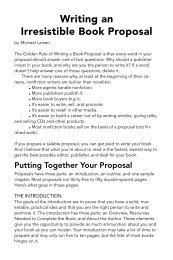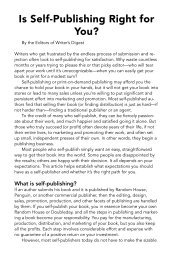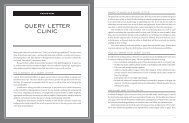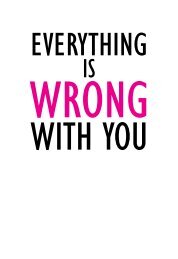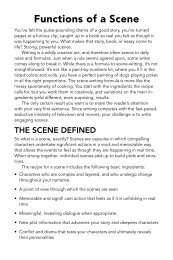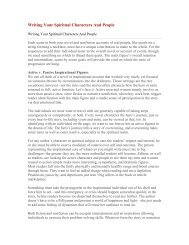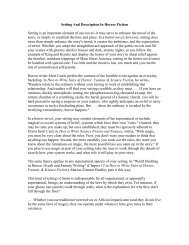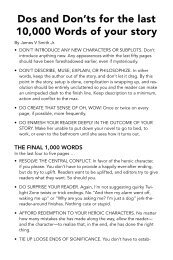Copyright Basics - Writer's Digest
Copyright Basics - Writer's Digest
Copyright Basics - Writer's Digest
You also want an ePaper? Increase the reach of your titles
YUMPU automatically turns print PDFs into web optimized ePapers that Google loves.
y Jane Friedman<br />
<strong>Copyright</strong> <strong>Basics</strong><br />
Once my work is copyrighted, how long is it protected?<br />
For works copyrighted through the U.S. <strong>Copyright</strong> Office on or after<br />
January 1, 1978, copyright protection lasts for the rest of the author’s life<br />
plus seventy years after her death. For works published prior to 1978, the<br />
term will vary depending on several factors; see the U.S. <strong>Copyright</strong> Office<br />
Web site (www.copyright.gov) for an explanation.<br />
What is public domain?<br />
Any published or distributed material on which a copyright has expired is<br />
considered to be in the public domain—that is, available for use by any<br />
member of the general public without payment to, or permission from,<br />
the original author.<br />
When I sell various rights to my work, doesn’t that affect<br />
my ownership of the copyright?<br />
No. Various rights are all part of your copyright, but selling them in no<br />
way diminishes your ownership of the actual work. William Strong, in<br />
The <strong>Copyright</strong> Book, likens copyright to ownership of land. “If you own<br />
a parcel of land, you can sell mineral rights to A, water rights to B, and<br />
a right-of-way to C, and still be considered the owner of the underlying<br />
property,” he writes. In the case of written work, you may sell paperback<br />
reprint rights to one company, film and television rights to another, and<br />
book club rights to still another without impairing your ownership of the<br />
original work.<br />
When an editor tightens up my article, correcting a<br />
weak ending and other flaws, is the resultant article<br />
still under my copyright?<br />
Yes. Usually, an editor’s changes in your manuscript will not be extensive<br />
enough to qualify as a new work derived from your own. However, if your<br />
work is going to be heavily revised, you should clarify with the editor that<br />
the article is still yours, not hers.
If I transfer certain rights to my manuscript to another<br />
party, do I relinquish those rights forever, or can I get<br />
them back at some point in the future?<br />
If a specific time period is not written into the rights you grant someone—for<br />
example, an option on your book by a motion picture producer<br />
might have a term of one year—then you still have the right to terminate<br />
the grant of those rights. Check current copyright law to find out specifics<br />
relevant to your situation.<br />
How do I copyright my articles and stories?<br />
Under current copyright law, your work is protected by statutory copyright<br />
as soon as it is created in tangible form. It need not be published<br />
to be protected, and you do not have to display the copyright symbol on<br />
your manuscript.<br />
Only if you think you might have to go to court and fight to prove<br />
your ownership of the work is it necessary to register the material with<br />
the U.S. <strong>Copyright</strong> Office. For the proper forms and more information,<br />
visit the office’s Web site at www.copyright.gov.<br />
How necessary is the effort and expense of having a<br />
work registered at the copyright office before its publication?<br />
Since your work is copyrighted from the moment you create it, the<br />
existence or validity of your copyright will not be affected if you don’t<br />
register the work. You can still bring a lawsuit against anyone who infringes<br />
upon your copyright without having a formal registration, though<br />
you may not be able to collect as much in damages and you may have a<br />
weaker case.<br />
In most cases, it’s not worth the expense or bother to register your<br />
work; the only situation in which you do need to worry about registration<br />
is when writing scripts.<br />
Should I secure a copyright for my book manuscript<br />
before submitting it to trade houses?<br />
No, the publisher who buys the manuscript will copyright the book in<br />
your name. A clause in most contracts between publishers and authors<br />
sets up an agreement whereby the publisher takes out the copyright in<br />
the name of the author. The publisher merely handles the paperwork on<br />
behalf of the author, and the copyright is the author’s property. If you
glance through a sampling of current bestsellers, you’ll find that the author’s<br />
name, not the publisher’s, usually follows the copyright symbol.<br />
A publisher has made me an offer that stipulates it will<br />
own copyright to my work—it’s a work-for-hire situation.<br />
Should I take it?<br />
That’s up to you. Normally, a writer should never give up her copyright<br />
to another party. To give up copyright means that you give up all legal<br />
rights to the work, meaning you cannot benefit from any use of the work<br />
after the initial publication. But if you’re offered enough money for the<br />
work, and you wouldn’t have interest in the material after its initial publication,<br />
it might be worth your time. You’ll have to weigh the risks.<br />
I have copyrighted some pieces that I am trying to sell<br />
as columns to newspapers. If they are published in the<br />
papers, would I have any copyright problems putting<br />
the same material into book form?<br />
As long as you are selling only simultaneous serial rights to the newspaper<br />
columns you have copyrighted, book rights belong to you.<br />
Is there any situation in which I can lose copyright protection?<br />
No, not unless you grant your rights to someone else in writing.<br />
Does the copyright law give copyright protection to<br />
titles?<br />
No, it is not possible to copyright titles of any type.



